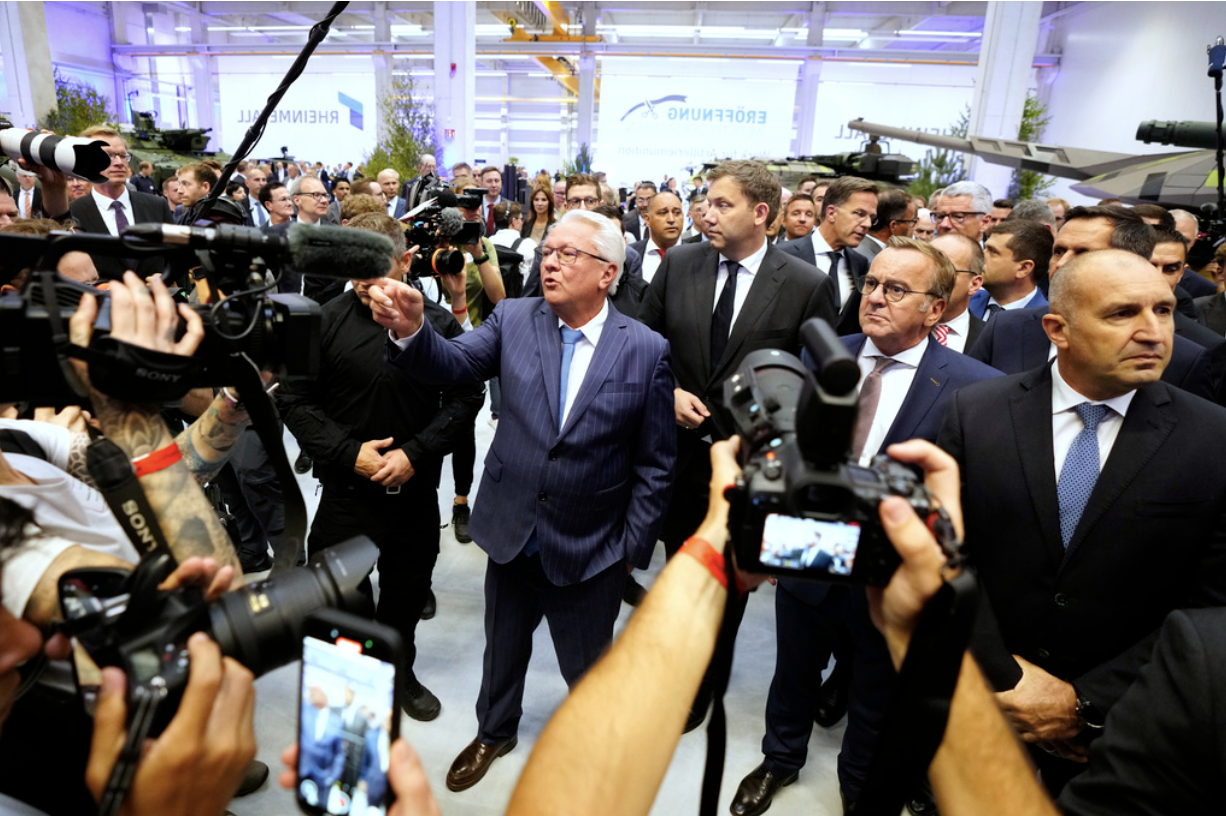Germany Seeks to Strengthen Armed Forces
Bundeswehr Chief Carsten Breuer, NATO SACEUR General Alexus Grynkewich, Chancellor Friedrich Merz, Defense Minister Boris Pistorius, and Finance Minister Lars Klingbeil before a Cabinet meeting at the Defense Ministry in Berlin, Aug. 27, 2025. Photo:AP News
In August 2025, Germany’s center-left and far-right coalition introduced a bill that would significantly increase military spending.
A federal draft bill the cabinet approved in 2025 would create a new, large-scale voluntary military service program with a built-in mechanism to reintroduce conscription if volunteer targets aren’t met.
As fears circulate about Russia’s growing aggression, Germany seeks to gather more support and military personnel in order to strengthen their armed forces, something that has been derailed since WWII. Friedrich Merz, Chancellor of Germany and former leader of The Christian Democratic Party (CDU), passed plans in parliament to boost defense spending by easing spending limits with aims to make the German armed forces “the strongest conventional army in Europe.” Germany has allocated more funding towards their defense budget, planning to spend €649 billion ($761 billion) on the military in the next 5 years, in alignment with NATO’s respective security plan.
German Defense Minister Boris Pistorius, says that it is necessary for the Bundeswehr, the German armed forces, to continue to grow. At the end of last year, Germany’s military counted around 183,000 active personnel. However, the government says it plans to expand the force in the coming years to about 260,000 soldiers, in addition to roughly 200,000 reservists.
With historical sensitivity stemming from World War II, German politicians and the public are careful to tread over the reintroduction of fast military expansions. In confronting its Nazi legacy, the country has undertaken significant efforts to dismantle and reform its defense institutions.
Conscription for men was removed in 2011, but due to this move, it has been proven difficult to gather much willingness for volunteers to serve at all. To combat this, incentives are being offered, such as paying higher rates for people who volunteer or giving flexibility in their periods of active duty. Additionally, the German government has tried to push recruitment campaigns for the military by targeting young adults approaching 18 years of age. Men and women are sent surveys on their willingness to serve, which men are required to answer. Men are also obligated to undergo medical evaluations, whether or not they join the army.
The coalition has been slow to come to much agreement on the bill. While legislators from the Social Democratic Party (SPD) advocate for a voluntary service model, conservative lawmakers are pushing to reinstate conscription. This debate has prompted senior members of parliament to propose a draft that would call up men only if volunteer registration numbers proved insufficient — a plan Pistorius dismissed as a “lazy compromise,” rejecting it outright.
Many believe that a volunteer service just isn’t enough. Markus Söder, member of the German Federal Council, suggests that threats from Putin to advance past Ukraine could come as early as 2027. He warns that if such a risk is inevitable in the next few years, Germany must prepare sooner rather than later.
Rheinmetall CEO Armin Papperger with NATO’s Mark Rutte, Defense Minister Pistorius, and Vice Chancellor Klingbeil at the inauguration of Rheinmetall’s new artillery plant in Unterlüß, Germany, Aug. 27, 2025. Photo: AP News
Back in August, German Vice-Chancellor Lars Klingbeil and Boris Pistorius, along with NATO Secretary-General Mark Rutte, inaugurated a new artillery ammunition factory, claimed by defense contractor Rheinmatell to be the largest in Europe. The new factory underscores Germany’s role in Europe’s broader military buildup amid concerns about Russian aggression, signaling a shift toward greater defense self-sufficiency and NATO cooperation.
The efforts from Germany reflect Europe’s collective securitization efforts. As the German military strengthens its capabilities, NATO’s ability to deter is improved and Central and Eastern Europe are stabilized. With Germany lying as the economic and political heart of Europe, their actions set a benchmark; countries like Poland and France, as well as the Nordic states will likely increase defense investments to match or coordinate similarly to Germany. Remilitarization efforts could stabilize Europe’s defense capabilities, but could also reignite debates about Germany’s militaristic transformations and historical memory.


